
There are almost as many Gnawa styles as
ancestral cities which feature their sound.
Gharbaoui, Shamali resonates from the north.
Soussi and Casaoui (Casablanca),
Marrakchi (Marrakech)-style
originates in central Morocco and through to the South.

Gnawa of Ganga, Lalla Krima/
Mimouna live in the Sahara
/southeast, play tbal and karkabou, plus
have their separate zawiyas from
Gnawa of Bilal (Music of the Gnawa of Morocco, pg. 30).
They play until dusk, because only
maalems can lead possession.
It's absolutely amazing.
Musicians from Simo Errebbaa,
Bnat Gania, Samir LanGus
Maalems Mahmoud Gania, Hamid el
Kasri to Abdelkebir Merchane,
Abdelouhed and Rida Stitou fuse styles as they create
further Gnawa fusion all its own.
Diaspora nuances music!
An audial median exists between the player and spiritual world.
But apply the same logic to regional sounds.
Abderrahmane Kirouche, or Maalem Paco played Casaoui and
Marsaoui because he was from Essaouira, but learned tourka
(Gnawa custom) from Maalem Benthami
Some cities are in central Morocco, so they may
borrow from Shamali (North), their own style
Marsaoui (Essaouira) or even Soussia (South)
You learn over time.
Guembri strumming and instrumental arrangement
is more melodic call-response in the Shamali style
which resonates through northern Morocco.
Gnawa music progresses into more percussive modes
as you follow the route back to Marrakech,
a Moroccan gate toward West Africa (Brussels Studies).
CASAOUI
The Boussous hail from Casablanca, and chill
me with their effortless tagnaouite.
Abdelkader and Abderrahim Benthami are
also masters in the Casaoui style.
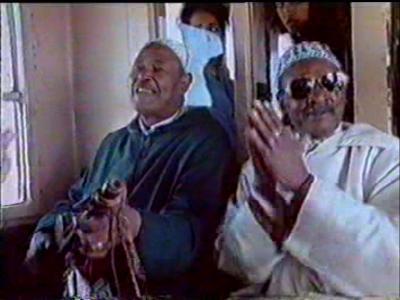
Maalem Sam and Abdelkader Benthami
Abdenbi el Gadari moved to Casablanca
after life as a Marrakech musician.
This is a 2007 interview with Maalem Hmida.
Remember how Gnawa came from Hausaland and northeastern Niger?
'Houssa/Dutiwa' tells the tragic tale with redemption from Allah,
plus spirits we have learned to love.
Duti is 'drum player' in Zaranda, a language
in modern-day Bauchi State, Nigeria near
Lake Chad (ResearchGate).
Foulani refers to the Fula tribes who live there too.
Ahmed wisely noted that pan-African
diasporic connections like that
with Randy Weston would bring Gnawa further into the future.
"The Gnawa is an honorable calling.
I trust and hope that Gnaouism will continue to flourish
and gain respect of the public,
which is often uninformed about it.
Then, there is the guenbri we must get to know.
Meeting Randy Weston has done much to
promote the instrument and its music, in general."
Hassan Boussou is quite the virtuoso.
Asmaa Hamzaoui, Bnat Timbouktou and
father Maalem Rachid play
Casablanca's style: a blend of North, Central and South.
'Ftouh Rahba' encompasses medieval Moroccan markets
which sold everything from Gnawa's ancestors to jawi,
zmeita, the same goods you find in today's souks.
And it also welcomes al-mlouk as a lila's opening...
FASSI
We travel now to Fes and hear Innov Gnawa!
They are a traditional group with Maalem
Ben Jaafar (Fes), Nawfal Atiq,
Samir LanGus (Agadir), Ahmed Jeriouda, Amino
Belyamani, Said Bourhana.
Want to hear Gnawa's roots?
Innov Gnawa performed at Bnai Israel Synagogue three years ago,
the Sebityin suite which has great worth as a nubat
(musical suite within Gnawa ceremonies).
These include songs from ancient Moroccan
Jewish bonds with Muslims who broke bread with them
during Passover/Mimouna.
and listen to Samir's sintir expertise!
MARRAKCHI
Famous Bakbou (Ahmed and Mustapha) maalems were born here.
Maalems Abbas Baska, Abdenbi el Gadari,
Abdelkebir Merchane, all Marrakchi!
Mustapha Essghir featured on Gnawa and
Diasporic African Power, and played with
Baska! Download and/or listen to
Mufaja'at Elmoussem here, featuring
Mustapha "Sam" Essghir, Abbas Baska and Abdenbi Binizi.
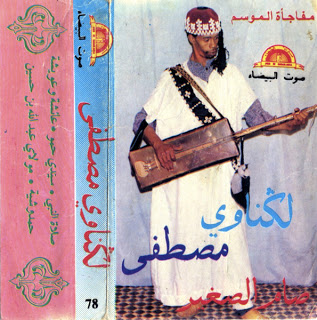
Daqa Marrakchiyya appears in Gnawa often,
and from rhythmic clapping we love
to their blaring, brassy horns,
Marrakech has an incredible style of music.
Expect ghayta (link).
Listen to Maalem Ahmed Bakbou,
Abdelkebir Merchane and co. at a lila.
MARSAOUI/MARSAWIYYA
The Gania family (Maalems Abdellah,
Houssam, Mahmoud, Mokhtar) plays this instantly
recognizable style in Gnawa.
Maalem Paco, Nass el Ghiwane's founder
and lead singer, did as well, as you read earlier.
He became a master by 16 years old!
Marsaoui describes Essaouira's sound.
The Gania family has heritage from Mali and Senegal.
They are healers in various fields for generations.
MEKNASSI
Enjoy Maalem Abdenbi el Fakir, known as Maalem
Abdenbi el Meknassi (the one from Meknes)!
This is his album Swakn, worth endless listening
for its ability to place you there with him.
RABATI
Rabati Maalem Abdelkader Amlil's
rendition of 'Hamdouchia'.
Maalem Si Mohamed Chaouqi is Rabati!
He was quite the spirit master, who
loved to play Gnawa with his
family and Les Gnawa du Maroc, even Jimi Hendrix
(Traveling Spirit Masters: Moroccan Global Trance...)
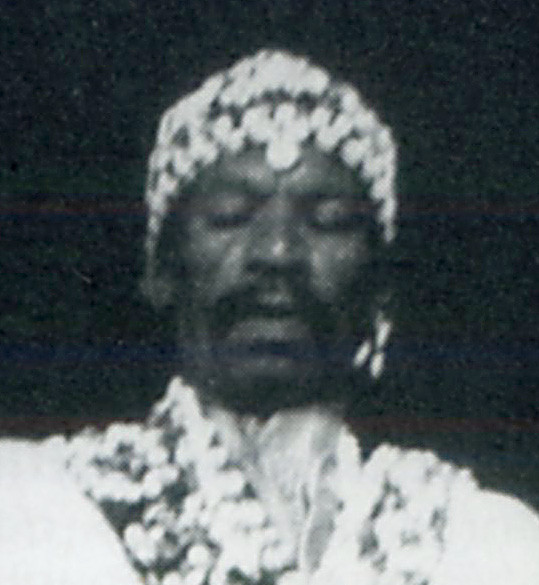
Check out Simo Errebbaa's Rabat mastery.
He is a long-time friend, and we would be less humble,
knowledgeable without them. Shokran bzzaf, koyo.
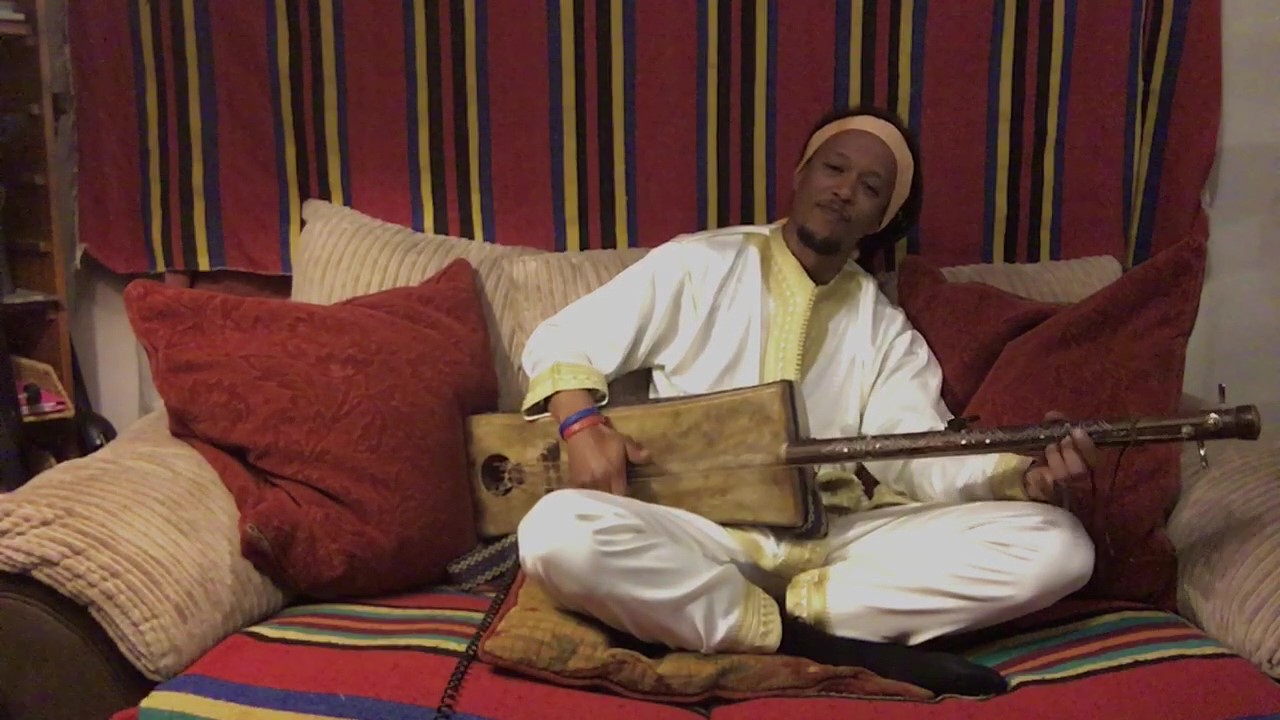
This is Simo here!
SHAMALI
Maalem Abdellah El Gourd is unbelievably talented
in his preservation of Gnawa music and artistic communication.
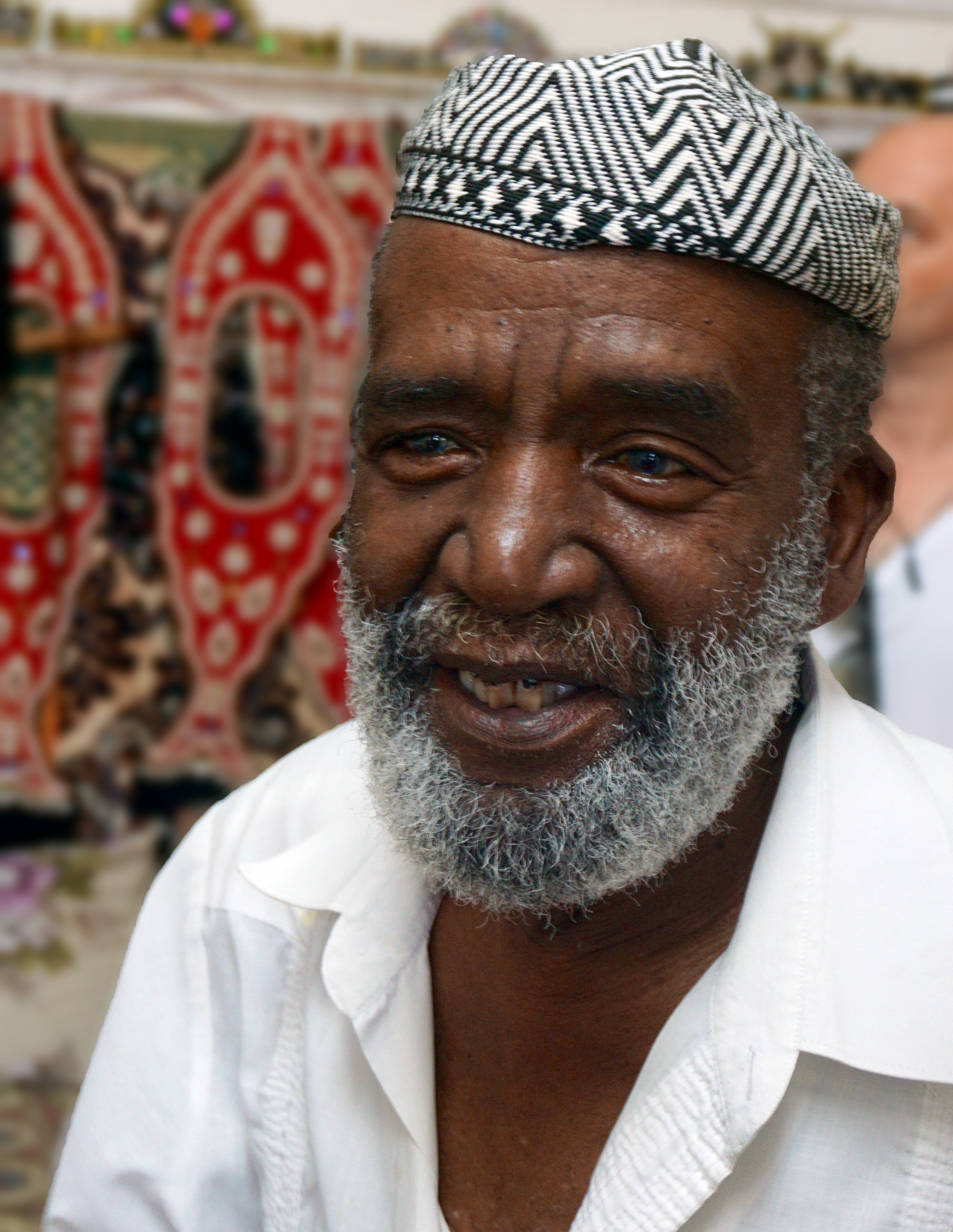
Maalem
Abdellah Boulkhair El Gourd
"Abdullah Al-Gourd, he was very interested
in the history of his people.
Because of him, I recorded and I met some of the old Gnawa.
I met Gnawa who were 80 and 90
years old, who remember were walking
across the Sahara desert." (Art Works)
He taught us much within his lifespan
that otherwise would be forgotten.
Don't take our word for it!
Listen to Maalem El Gourd himself.
Hamid El Kasri learned from Maalem
Abdelouhed Stitou while in Tangier.
Stitou migrated to Belgium and began a new
troupe there with his son too, Rida.
Maalems Abdelwahad and Rida "Stitou" Barrady(middle) and Gnawa de Bruxelles
We gotta respect Gharbaoui.
SOUSSIA
The Draa is a beautiful, powerful river which flows from
northern Morocco through mountains to Saharan sands.
Hear 'Soussia' by late Casablanca Maalem Hmida Boussou.
The valley is particularly significant since more oases
exist here than much of Morocco (or northern Africa).
This nourishes everyone from High Atlas citizens
to Ismkhan, darker-skinned Amazigh communities
in Errachidia, Khamlia, Merzouga and Tizounine.
These are Ismkhan Gnawa, of Lalla Mimouna.
Khawa was the median oasis between
Marrakech, Tagheza and
Tombouctou ([Notes sur L'histoire des
Populations du Sud Marocain]).
Both guembri-playing Gnawa (of Sidi
Bilal) and Gnawa of Ganga
have a beautiful, percussive, Tamazight-influenced style.
Wherever Gnawis go, their music IS communion.
GNAWA AND
DIASPORIC AFRICAN POWER GNAWA
STREAM I (![]() )
GNAWA STREAM II
(
)
GNAWA STREAM II
(![]() )
GNAWA STREAM III
(
)
GNAWA STREAM III
(![]() )
GNAWA LIVE STREAM V (
)
GNAWA LIVE STREAM V (![]() )
)
GNAWA LIVE STREAM VI (![]() )
GNAWA LIVE STREAM VII (
)
GNAWA LIVE STREAM VII (![]() )
GNAWA LIVE STREAM VIII
(
)
GNAWA LIVE STREAM VIII
(![]() )
)
The Gnawa Musicians in Brussels: A Cultural Reorganisation Dekka El Marrakchia Gnaoua Music Festival Africa From The Twelfth to the Sixteenth Century
Rebel Music: Race, Empire and the New Muslim Youth Culture The Festive Sacred and the Fetish of Trance The Gnawa World Music Festival in Essaouira